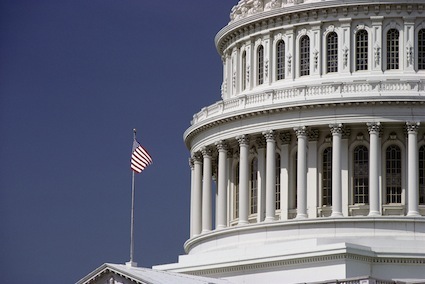CCIA Study: Edge Regulations Could Spell $300 Billion Economic Hit
Trade group says Comcast, Disney could be among collateral damage of Big Tech-targeted bills

The smarter way to stay on top of the multichannel video marketplace. Sign up below.
You are now subscribed
Your newsletter sign-up was successful
Computer companies currently facing increased regulation and legislation from Washington are warning that such government action could cost the economy $300 billion and affect companies as wide-ranging as Comcast and Home Depot, as well as the edge-provider behemoths — Facebook, Google and Twitter — that are the bills‘ principal targets.
That was the takeaway from a just-released study from NERA Economic Consulting commissioned by the Computer & Communications Industry Association.
The study came out just hours after powerful senators signaled they would be grilling edge providers Instagram, TikTok and YouTube at a hearing next week.
The CCIA study asserts that, under proposed edge-targeted legislation, more than a dozen companies, including Comcast and Netflix, would be subjected to "significant regulatory risks" stemming from an "overly broad" definition of online platform, the extensive regulatory scaffolding that would erected, the discretion given competition authorities and the penalties for noncompliance.
Among others on the list of affected companies are The Walt Disney Co., AT&T and Cisco Systems, which along with Comcast and Netflix would “exceed the inflation-adjusted market cap threshold of $550 billion or $600 billion from the bills in the next five to 10 years.”
That is assuming the legislation subjects online platforms and marketplaces to “common carrier, structural separation and line of business restrictions.”
Congres is considering a number of bills to rein in Big Tech, including ones targeting Section 230 of the Communications Decency Act, which holds that companies cannot be treated as the publisher or speaker of information provided by users. The current legislative focus of Big Tech’s pushback, though, is the just introduced American Innovation and Choice Online Act. That measure would prevent an online platform from: 1) keeping another business form interoperating with a dominant platform of other business; 2) requiring a business to buy a dominant platform's products or services in order to get preferred placement; 3) "misusing" a business's data to compete againt it, and 4)biasing search in their favor.
The smarter way to stay on top of the multichannel video marketplace. Sign up below.
The bill allows civil penalties for violations of up to 15% of U.S. revenue for the duration of the violation and authorizes a court to penalize a CEO or corporate officer an amount equal to their compensation for the 12 months preceding or following a complaint.
Legislation that sets size thresholds for companies would force them to break up to avoid regulation, reversing cost savings that benefit consumers, the analysis concluded. By contrast, such restrictions would not apply to foreign operators of online platforms, creating a bias against U.S.-based companies.
“The bills are likely to negatively impact consumers, small and medium-sized businesses, U.S. firms’ international competitiveness, and the broader economy," CCIA director of research and economics Trevor Wagener said. “The preliminary findings will inform the public discourse surrounding these bills as policymakers determine whether the legislation’s purported benefits outweigh the costs.”
Contributing editor John Eggerton has been an editor and/or writer on media regulation, legislation and policy for over four decades, including covering the FCC, FTC, Congress, the major media trade associations, and the federal courts. In addition to Multichannel News and Broadcasting + Cable, his work has appeared in Radio World, TV Technology, TV Fax, This Week in Consumer Electronics, Variety and the Encyclopedia Britannica.

